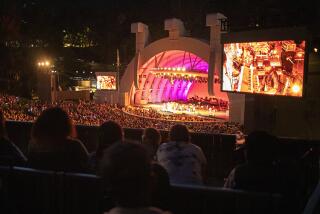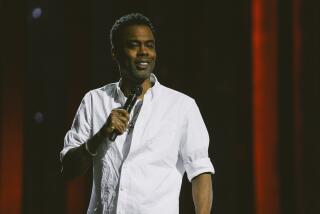From the Archives: The Don of Saturday night
It was announced Friday that “Sábado Gigante” is ending its run after 53 years on the air. As we look at the show’s history, here is a Times feature on host Mario Kreutzberger, better known as Don Francisco, originally published on May 29, 2001.
Mario Kreutzberger has been booked every Saturday night for the last 40 years--with women in bikinis, boisterous singers and other live performers. The escapades on the television show “Sabado Gigante” (Giant Saturday), and his work as a UNICEF ambassador have earned him a decoration from the Pope, an entry in the Guinness Book of World Records and a starring role in the homes of millions of television viewers in the Western Hemisphere.
And now Kreutzberger, who’s known in 42 countries by his stage name, Don Francisco, is getting his own star on the Hollywood Walk of Fame on June 8.
RELATED: Spanish TV staple ‘Sábado Gigante’ to end run after 53 years on the air
“The star means you’ve made it,” declared Johnny Grant, honorary mayor of Hollywood. In a business where people are “canceled,” as their shows are “dropped,” Kreutzberger remains as popular as ever, as he grows alongside the quickly-expanding international media empires.
His original show was launched in Santiago, Chile, on a Sunday in 1962 under the title “Omnibus.” After a short time it was rescheduled for Saturdays and retitled “Sabado Gigante,” with Kreutzberger holding court for eight hours of live television each week.
“I had one hour for kids, one hour for couples, games, humor, interviews,” he said. “It was like a small telethon every Saturday.
In 1986, he brought the show to the United States, and network executives tapered it to a mere four hours each Saturday night. The show remains incredibly popular, drawing millions of viewers to Univision, the largest Spanish-language television network in this country. As host of the longest running television program in the Americas, Kreutzberger has welcomed singers Placido Domingo, Gloria Estefan and Ricky Martin. Last year, during the U.S. presidential campaign, he hosted Vice President Al Gore and Texas Gov. George W. Bush.
“I gave them the same amount of time,” Kreutzberger pointed out. “I believe the Hispanic Americans want to know more about the politicians’ personal side.”
And in April he began hosting “Quien quiere ser millonario”--Chile’s version of the ABC hit game show “Who Wants to Be a Millionaire.” The show is broadcast on Channel 13 in Chile, the country’s main television station, which is partially owned by the Vatican. If it’s a hit, Kreutzberger will spend three weeks a month taping “Sabado Gigante” from the Miami studios of Univision and several days a month taping “Who Wants to Be a Millionaire,” in Chile.
*
Kreutzberger believes his success is due in large part to his ability to connect both with his studio audience as well as his national television audience, whose backgrounds range from Caribbean to Mexican American.
“I was always a minority, so it was very easy for me to understand what it means to be a minority. The only difference for me is that the minorities in my country don’t have their own television network,” he said. “People need communications in their own language and to be connected to their culture.”
The son of Jewish German immigrants who fled anti-Semitism in the late 1930s, Kreutzberger was reared in Chile. His father, an entrepreneur, had decided his oldest son would be a world-famous men’s clothing designer, so he sent Kreutzberger to New York City in 1959 to learn the industry.
“I came to the Stanford Hotel at 32nd and Broadway--without the language. I came into the room, and I saw a radio set with glass in the middle, and you pushed the middle and it was a radio with images,” Kreutzberger said. “Then I realized the future was the television, and somebody else would have to be a men’s clothing designer.”
When he returned to Chile three years later with a technical degree in clothing design, the country was preparing to host soccer’s World Cup. The event brought “educational” television to Chile, and the university ran coverage of the games, without commercials. Kreutzberger saw an opportunity to make his way in Chilean television, just as it was getting started.
And now he finds himself back in Chile, hosting “Millionaire” in a conservative, overwhelmingly Catholic country where bikini-clad women on television are a no-no.
“They are a little restrained,” he said, sighing.
More to Read
The complete guide to home viewing
Get Screen Gab for everything about the TV shows and streaming movies everyone’s talking about.
You may occasionally receive promotional content from the Los Angeles Times.






